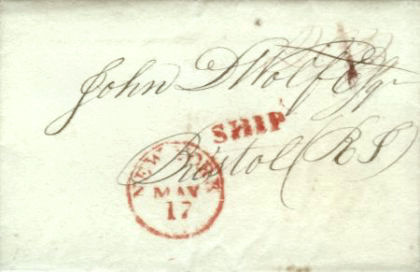|
The Bristol,
Rhode Island
branch of
the
D’Wolf family (or
DeWolf)
first came to prominence during what was known as
“King George’s War,”
(1744-1748).
Mark
Anthony DeWolf was born in Guadeloupe
on
November 8, 1726. He was the
son of Charles DeWolf, a wealthy merchant and slave
owner on the
island. Simeon Potter, a notorious Bristol privateer, slaver
and merchant, originally brought
the
young DeWolf to
Rhode Island
as a clerk or private secretary for his many
business ventures.
NOTE:
DeWolf
married Simeon’s sister, Abigail.
DeWolf’s
first shipboard position was serving as quartermaster aboard Simeon Potter’s
privateer, “Prince
Frederick” under Captain Trowbridge in
1747. Although the
war officially ended in 1748, both French and
British privateering vessels continued to prey on each others ships. In 1756
Captain DeWolf took command of Potter’s privateer Roby.
Historical records note that in 1757, DeWolf sailed from
Warren,
Rhode Island
in a 50 ton sloop and that during this voyage; he
captured a French vessel of 150 tons. DeWolf continued to prosper after he went
into business on his own as both a privateer and slave trader.
The colony of Rhode Island
was by far
the
most active of the
colonies in the
slave trade and
the
D’Wolf brothers of Bristol,
Rhode Island
were by far the
most active family in the
trade. The D’Wolf family's venture into
the
slave trade flourished during
the
years 1790 to 1807 under Mark’s sons; James,
John, William, Charles, and Levi, and a nephew named
George. There were a total of 109 recorded slaving voyages attributed to the
D’Wolf family as either
sole owners or jointly with other owners. (And
most likely many more unrecorded voyages).
James was
the
first of
the brothers
to venture into the
slave trade with his ship
Polly
in 1790. During
the
return voyage from
Africa
to
the
West Indies, an incident occurred for which James was indicted
by a Federal Grand Jury for murder, but never bought to trial. Approximately
two weeks into
the
voyage, one of
the
female slaves became sick with what was thought to
be smallpox. D’Wolf initially had her placed on the
main top, (mast)
to keep her from infecting
the
rest of
the
slave cargo. When her condition continued to worsen;
D’Wolf had her lashed to a chair and tackle, after which he personally
lowered her overboard. (Of
the
entire
family,
James
was
the
most
heavily engaged in
the
trade.)
John
D’Wolf, the
recipient of the
letter above, was also heavily engaged in
the
slave trade during this period and other than his
brother James, appears to have been more involved
personally than any of
the
rest of
the
family. There were 21 recorded slave voyages on
which he either sailed as captain or shared in
the
ownership.
(It
should be noted at this point, that after
the
slave trade
was outlawed, records were not kept and there were
obviously many more slave voyages that went unrecorded.)
The slave trade,
particularly as it concerns
Rhode Island’s interest in
the
trade, was known as the
“Triangle
Trade.” Slaving
ships left
Rhode
Island
with
Rum and
other
cargo for West
Africa
where they traded for slaves, which were
then
carried to ports in the Caribbean
and sold. Sugarcane and molasses would be purchased in island ports such as Havana,
Cuba
and transported back to
Rhode
Island
where local distilleries transformed it into rum and
the
vicious cycle would begin
once
again. The
largest distillery in
Bristol, (and
in Rhode
Island)
was owned by the
D’Wolf family.
(There were also two large distilleries in Newport,
Rhode Island.)
Members of the
D’Wolf family were engaged in every facet of
the
slave trade. There were D’Wolfs engaged in
distilling
the
rum and D’Wolfs serving as captains on slave
ships. Members of
the family
financed slave trips and owned 48
ships of their own in
the
trade. In addition,
the family
owned plantations
in Cuba
and in
Guadeloupe
where slaves were taken and worked when market
prices were low. James, the
scion of the family eventually became a U.S. Senator
and
the
second richest man in America. It can truly be stated, “That
the
D’Wolf
family
fortune was built on the
backs of slaves.”
|
![]()

